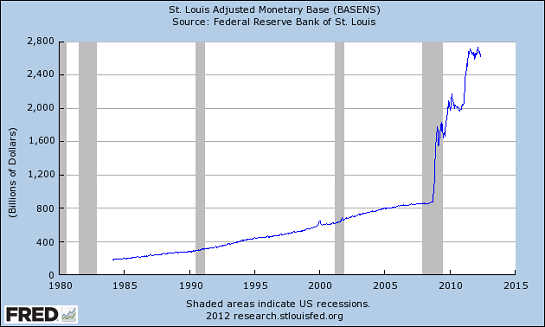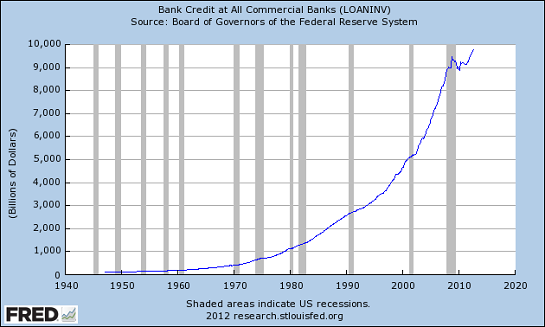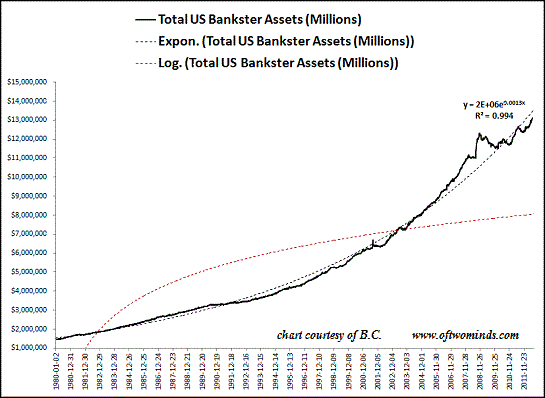They also own the media and leverage that media to propagandize their point of view. George Soros is a good example. He is connected to the globalist cartel and continues to warn of global economic collapse and riots in the USA if the European Union doesnt continue to bailout the European branches of the cartel.
So, look at the charts below and watch as the Federal Reserve prints money out of thin air, gives it to the banks, the banks strengthen their balance sheets with real assets and flood the market with more money. Oh and yes, then a little bit of that money trickles down like piss onto the rest of the economy, meanwhile the price of everything you and I must buy goes up and up. And how are wages? Stagnant. The cost of housing? Well out of the range of most people, so they have to borrow.
This is a scam. The mother of all scams. It is a 20-30-40 year ponzi scheme scam that gradually strips money and wealth out of an economy.
Here is the monetary base of the U.S. Notice the big ramp-up as the Federal Reserve responded to the global financial crisis with a flood of liquidity/expansion of base money supply.

Bank credit has skyrocketed. Plenty of credit sloshing around the system. This curve looks exponential, i.e. unsustainable.

Bank assets have risen exponentially along with credit.

If we look at what's skyrocketed in price (healthcare, college tuition), we find they are government funded and supported. This is not a coincidence.
Inflation is generally viewed as a monetary phenomenon (print money excessively and you get inflation), but let's use a very simple definition: any loss of purchasing power. If your income buys fewer goods and services, for whatever mix of reasons (geopolitical, weather, monetary, fiscal, etc.), that's inflation "on the ground."
Consider this breakdown of the components that together make up the standard measure of inflation, the Consumer Price Index (CPI): (courtesy of dshort.com) What are the obvious major sources of inflation? Energy, medical costs and college tuition.
CPI Year-to-Year Growth
The CPI-U (consumer price index) is the broadest measure of consumer price inflation for goods and services published by the Bureau of Labor Statistics (BLS).
While the headline number usually is the seasonally-adjusted month-to-month change, the formal CPI is reported on a not-seasonally-adjusted basis, with annual inflation measured in terms of year-to-year percent change in the price index.
In the chart below from Shadowstats.com you see an SGS-Alternate CPI estimate based on the methodology which was employed prior to 1980. Yes, our clever government changed the way inflation was calcualted so that they could continue with their little scam.

The price of oil in the U.S. is influenced by many factors--geopolitical, currency, technology, policy, etc. Nonetheless, the rough correlation between base money supply and the price of oil in dollars is noteworthy:
Government spending and intervention fuel inflation, and the Federal Reserve enables that spending and inflation by monetizing Federal deficits. Raising expectations of inflation has powered oil higher on speculative buying, but it's difficult to generate economy-wide inflation when wages are declining (courtesy of dshort.com):
Eventually, declining wages lead to demand destruction, as households consume fewer goods and services. But inflation that is being driven by government spending will not decrease, as the demand is being supported by a borrow-and-spend Central State supported by a monetize-Federal-debt-til-Doomsday Federal Reserve.



No comments:
Post a Comment